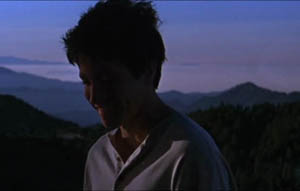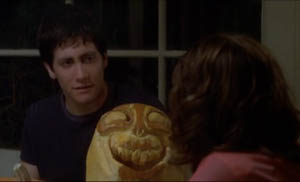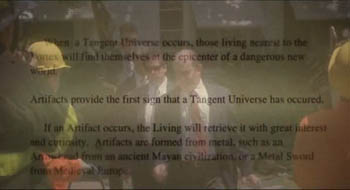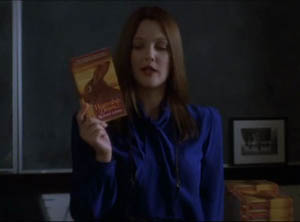|
Donnie Darko is bizarrely and endlessly fascinating, an enigma wrapped several layers deep, and not all of them having to do with the plot. That might sound like a ringing endorsement, and it isn't, really, but neither is it the opposite. I am genuinely perplexed and puzzled by this film's very existence, by what it is and why. 
Donnie Darko was a film which was barely in the theaters long enough to get loaded onto the projectors, grossing a paltry half-million before finding a new and vibrant life with the home video audience. A cult following grew up around the DVD release, with fans endlessly debating possible interpretations and explanations of the film's obtuse plot. For anyone not in the know, the titular character is an emotionally disturbed sixteen year-old with a history of arson and depression who begins to see visions of a skeletal-faced humanoid rabbit that warns him that the world will end in just under a month. Despite his personal problems, Donnie is nevertheless a likeable young man with a strong sense of justice. Over the course of the next two hours, we'll see him feeling his way through life as he attempts to come to terms with incipient adulthood in a world full of confusing and threatening elements, the least of which not being the hallucinatory rabbit, who bids him to commit acts of wanton destruction. He can hardly refuse; his first encounter with the masked being he knows only as Frank saves his own life. Wandering out into the night at Frank's behest, he is spared when a jet engine falls from the sky and smack into his bedroom, an event given even greater mystique by the fact that no jets with missing engines have turned up anywhere. The story is an odd hybrid of complexity and minimalism: while it's obvious that something very intricate is going on, shockingly little of it is confirmed by the film itself. 
For a barely-there movie, the initial DVD release was pretty respectable, offering two commentary tracks for the curious viewer who might be eager for a little clarification of the film's many mysteries, and this, for me at least, is where the trouble started. I'd previously been prepared to cast newcoming director Richard Kelly as a possible name to be mentioned amongst the likes of David Lynch and Christopher Nolan, a trail-blazing puzzle-maker. After listening to four-odd hours of the director's own ideas concerning his work (he appears on both commentaries), I was struck by the sheer disparity between the film he was describing and the film I was actually watching. "And here," Kelly innocuously states over a shot of Donnie's father asleep in an armchair, "we're in an alternate universe." I'm fairly certain no one took that absolute non-cue as an indicator of what Kelly claimed it to be prior to hearing the commentary, and throughout the movie, he continues to allude to all manner of utterly untelegraphed plot ideas involving mysterious aliens or future beings, black holes, reanimated corpses and constantly manipulated living characters, who were apparently all serving the needs of an unseen Great Designer the entire time, instead of actually being the autonomous characters with their own ideas and motives I'd presumed (and preferred) them to be. After all this gobbledegook, I had much greater doubts about Kelly's strengths as a writer-director, and the worst was yet to come. In 2006, Kelly's sophomore directorial effort Southland Tales finally arrived, and was hands-down one of the worst, most thoroughly unenjoyable film-watching experiences of my life, utterly annihilating the significant quantity of goodwill with which I'd approached it. After 2009's The Box, with a premise cribbed from a sci-fi short story and then padded with rehashed Darko material and tangents going all sorts of nowhere, I'd come to believe nothing this man had ever directed could possibly have had merit, and approached the notion of revisiting his one critical success via his Director's Cut with much trepidation; a "Director's Cut" would likely mean Kelly running rampant, and I'd already seen the disastrous results of such an approach with Southland Tales. I couldn't escape the infuriating sense that I'd been conned by this film, but upon seeing the longer cut, I found I still liked and responded to it. This is where the enigma bleeds out from the film itself: how is it even possible that this film works at all? It's still remarkably affecting, even though I am now absolutely convinced that taken literally, the plot makes not a whit of sense. 
So is this new cut better or worse? It's a mixed bag, truthfully. There are numerous added scenes, many of which give more weight to the characters and their actions, and some additional material from the fictional Philosophy of Time Travel book allows the idea that the plot involves an alternate universe to come across at all. On the other hand, there's little that's less cinematic than just sticking a page from a book up on the screen, and even with this added explanatory material, there's still a marked lack of coherency, and a few bits also get deleted for no apparent reason (most notably Frank's prescient apology to Donnie in the theater scene), to the film's detriment. Other revisions, such as a class discussion of Watership Down, help to underscore Donnie's disconnect and ambivalence towards saving a world in which he feels no involvement. Nevertheless, exactly what he does in the end and how it could possibly work are as muddy as ever. If the increased clarity in the plot setup is worth the clumsy way it's handled, you might prefer this version; as with some of the revised soundtrack choices, it really boils down to personal aesthetics. 
So why then, given Richard Kelly's seeming inability to present a remotely clear or coherent narrative, does this film work at all? For starters, the cast is fantastic. Casting real-life siblings Jake and Maggie Gyellenhall as brother and sister was a real coup, and Mary McDonnell (as their mother, and best known these days as president Roslin from Battlestar Galactica) seems biologically incapable of giving anything but a great performance. Though the setting is 1988, the film manages a timeless quality, a nostalgic aura for anyone who's ever been a teenager, an easy point of identification for anyone who still is. Despite an almost total absence of functional explanatory power, the script is full of lovely little moments. When Frank the rabbit tells Donnie, "I can do anything I want, and so can you," we can feel the seductive power of this sentiment in Donnie's impish smile; what teen (or anyone else, for that matter) hasn't longed for such a pronouncement? Similarly, when informed that the world will soon end, Donnie responds with the best possible reply (a curious and almost amused "Why?"). The tone captures the spirit of youthful hope and adventurism in the way Spielberg's E.T. attempted, without the sugary presentation, and evokes teen angst without the soap-opera melodrama of tripe like Twilight; Donnie Darko maintains a healthy sense of humor. And it's always possible to simply plug your ears and yell "blah blah blah, I can't hear you!" with regards to the director's own explanations. The film has been viewed as a re-telling of The Last Temptation of Christ (a marquee for which is prominently featured), with Donnie as the reluctant savior of humanity, fumbling for a direction, rebuking false prophets and finally accepting his destiny, or an expressionistic portrayal of the apocalyptic feel of adolescence, with its raging emotions, its desire to be recognized, to not be impotent before the world, to, as Donnie says on multiple occasions, "change things." Jim Emerson, one of Roger Ebert's staff writers, posits a (flawed, I think) take on the film as an exploration of teen sexual awakening, though it depends too much upon the supposition that Donnie is fixated on his older sister, for which I can find no substantiation. Still, any of these viewpoints is more interesting than the director's own mishmash of alchemy and physics, which reads like "A Brief History of Time" by Stephen Hawking, age 5. Ultimately, the most frustrating thing about Donnie Darko is that it's hard to know how to feel about a film whose most effective parts, which are numerous, are almost certainly the result of complete, dumb luck. You can enjoy it, but it's hard to respect it. Watching this movie is like revisiting an old playground or other beloved childhood haunt: you'll always enjoy revisiting it for the feel it conjures up, but what made it special is inextricably tied to a specific place and time, impossible to re-create. With many movies for which one develops a fondness, one is tempted to explore further, to delve into its secrets, but here, as with Schrödinger's famous quantum-mechanical model, peering inside takes things off of the knife-edge of possibilities and just leaves you with some boring, run-of-the-mill cat, all its magic destroyed. Take the wizard's advice, and pay no attention to that man behind the curtain. -review by Matt Murray
|
|
||||||||